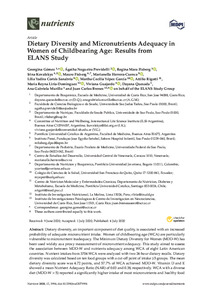Por favor, use este identificador para citar o enlazar este ítem:
https://repositorio.uca.edu.ar/handle/123456789/10554| Título: | Dietary diversity and micronutrients adequacy in women of childbearing age : results from ELANS study | Autor: | Gómez, Georgina Nogueira Previdelli, Ágatha Fisberg, Regina Mara Kovalskys, Irina Fisberg, Mauro Herrera Cuenca, Marianella Cortés Sanabria, Lilia Yadira Yépez García, Martha Cecilia Rigotti, Attilio Liria-Domínguez, María Reyna Guajardo, Viviana Quesada, Dayana Murillo, Ana Gabriela Brenes, Juan Carlos |
Palabras clave: | HABITOS ALIMENTARIOS; MICRONUTRIENTES; NUTRICION HUMANA; MUJER; FERTILIDAD; LATINOAMERICA | Fecha de publicación: | 2020 | Editorial: | MDPI | Cita: | Gómez, G., et al. Dietary diversity and micronutrients adequacy in women of childbearing age : results from ELANS study [en línea]. Nutrients. 2020, 12(7). doi:10.3390/nu12071994. Disponible en: https://repositorio.uca.edu.ar/handle/123456789/10554 | Resumen: | Abstract: Dietary diversity, an important component of diet quality, is associated with an increased probability of adequate micronutrient intake. Women of childbearing age (WCA) are particularly vulnerable to micronutrient inadequacy. The Minimum Dietary Diversity for Women (MDD-W) has been used widely as a proxy measurement of micronutrient adequacy. This study aimed to assess the association between MDD-W and nutrients adequacy among WCA of eight Latin American countries. Nutrient intakes from 3704 WCA were analyzed with two 24-hour dietary recalls. Dietary diversity was calculated based on ten food groups with a cut-off point of intake ≥5 groups. The mean dietary diversity score was 4.72 points, and 57.7% of WCA achieved MDD-W. Vitamin D and E showed a mean Nutrient Adequacy Ratio (NAR) of 0.03 and 0.38, respectively. WCA with a diverse diet (MDD-W > 5) reported a significantly higher intake of most micronutrients and healthy food groups with less consumption of red and processed meats and sugar-sweetened beverages. MDD-W was significantly associated with the mean adequacy ratio (MAR) of 18 micronutrients evaluated. Nevertheless, even those women with a diverse diet fell short of meeting the Estimated Average Requirements (EAR) for vitamins D and E. MDD-W is an appropriate tool to evaluate micronutrients adequacy in WCA from Latin America, showing that women who achieved the MDD-W reported higher adequacy ratios for most micronutrients and an overall healthier diet. | URI: | https://repositorio.uca.edu.ar/handle/123456789/10554 | ISSN: | 2072-6643 (online) | Disciplina: | MEDICINA | DOI: | 10.3390/nu12071994 | Derechos: | Acceso abierto | Fuente: | Nutrients. 2020, 12(7) |
| Aparece en las colecciones: | Artículos |
Ficheros en este ítem:
| Fichero | Descripción | Tamaño | Formato | |
|---|---|---|---|---|
| dietary-diversity-micronutrients-adequacy.pdf | 440,94 kB | Adobe PDF |  Visualizar/Abrir |
Visualizaciones de página(s)
98
comprobado en 30-abr-2024
Descarga(s)
103
comprobado en 30-abr-2024
Google ScholarTM
Ver en Google Scholar
Altmetric
Altmetric
Este ítem está sujeto a una Licencia Creative Commons

